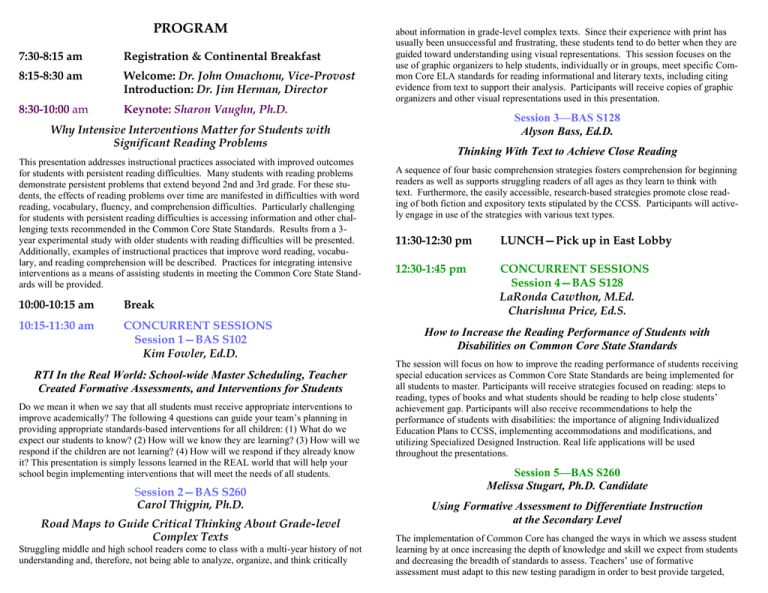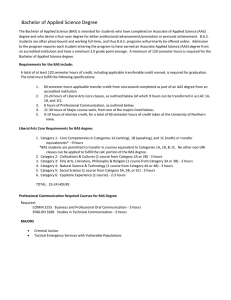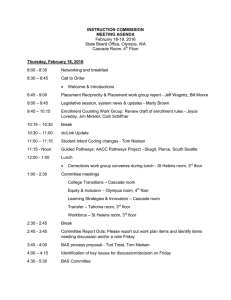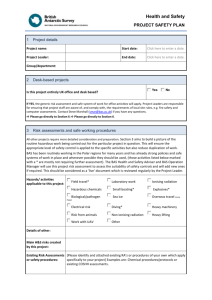PROGRAM
advertisement

PROGRAM 7:30-8:15 am Registration & Continental Breakfast 8:15-8:30 am Welcome: Dr. John Omachonu, Vice-Provost Introduction: Dr. Jim Herman, Director 8:30-10:00 am Keynote: Sharon Vaughn, Ph.D. Why Intensive Interventions Matter for Students with Significant Reading Problems This presentation addresses instructional practices associated with improved outcomes for students with persistent reading difficulties. Many students with reading problems demonstrate persistent problems that extend beyond 2nd and 3rd grade. For these students, the effects of reading problems over time are manifested in difficulties with word reading, vocabulary, fluency, and comprehension difficulties. Particularly challenging for students with persistent reading difficulties is accessing information and other challenging texts recommended in the Common Core State Standards. Results from a 3year experimental study with older students with reading difficulties will be presented. Additionally, examples of instructional practices that improve word reading, vocabulary, and reading comprehension will be described. Practices for integrating intensive interventions as a means of assisting students in meeting the Common Core State Standards will be provided. 10:00-10:15 am Break 10:15-11:30 am CONCURRENT SESSIONS Session 1—BAS S102 Kim Fowler, Ed.D. RTI In the Real World: School-wide Master Scheduling, Teacher Created Formative Assessments, and Interventions for Students Do we mean it when we say that all students must receive appropriate interventions to improve academically? The following 4 questions can guide your team’s planning in providing appropriate standards-based interventions for all children: (1) What do we expect our students to know? (2) How will we know they are learning? (3) How will we respond if the children are not learning? (4) How will we respond if they already know it? This presentation is simply lessons learned in the REAL world that will help your school begin implementing interventions that will meet the needs of all students. Session 2—BAS S260 Carol Thigpin, Ph.D. Road Maps to Guide Critical Thinking About Grade-level Complex Texts Struggling middle and high school readers come to class with a multi-year history of not understanding and, therefore, not being able to analyze, organize, and think critically about information in grade-level complex texts. Since their experience with print has usually been unsuccessful and frustrating, these students tend to do better when they are guided toward understanding using visual representations. This session focuses on the use of graphic organizers to help students, individually or in groups, meet specific Common Core ELA standards for reading informational and literary texts, including citing evidence from text to support their analysis. Participants will receive copies of graphic organizers and other visual representations used in this presentation. Session 3—BAS S128 Alyson Bass, Ed.D. Thinking With Text to Achieve Close Reading A sequence of four basic comprehension strategies fosters comprehension for beginning readers as well as supports struggling readers of all ages as they learn to think with text. Furthermore, the easily accessible, research-based strategies promote close reading of both fiction and expository texts stipulated by the CCSS. Participants will actively engage in use of the strategies with various text types. 11:30-12:30 pm LUNCH—Pick up in East Lobby 12:30-1:45 pm CONCURRENT SESSIONS Session 4—BAS S128 LaRonda Cawthon, M.Ed. Charishma Price, Ed.S. How to Increase the Reading Performance of Students with Disabilities on Common Core State Standards The session will focus on how to improve the reading performance of students receiving special education services as Common Core State Standards are being implemented for all students to master. Participants will receive strategies focused on reading: steps to reading, types of books and what students should be reading to help close students’ achievement gap. Participants will also receive recommendations to help the performance of students with disabilities: the importance of aligning Individualized Education Plans to CCSS, implementing accommodations and modifications, and utilizing Specialized Designed Instruction. Real life applications will be used throughout the presentations. Session 5—BAS S260 Melissa Stugart, Ph.D. Candidate Using Formative Assessment to Differentiate Instruction at the Secondary Level The implementation of Common Core has changed the ways in which we assess student learning by at once increasing the depth of knowledge and skill we expect from students and decreasing the breadth of standards to assess. Teachers’ use of formative assessment must adapt to this new testing paradigm in order to best provide targeted, differentiated instruction to struggling readers. Beyond sharing best practice on item creation for teacher-constructed formative assessments, this session will provide updates and connections to the PARCC assessments and content model frameworks. Session 6—BAS S102 Aimee Holt, Ph.D. Executive Functioning Strategies for Improving Reading In this presentation, Dr. Holt will discuss executive functioning skills and their relationship to reading. Dr. Holt also will review evidenced based intervention strategies for improving reading that are related to executive functioning skills. 1:45-2:00 pm Break—Snacks/Drinks in East Lobby 2:00-3:15 pm CONCURRENT SESSIONS Session 7—BAS S128 Lori Nixon, M.Ed. Common Core State Standards and Universal Design for Learning This session will focus on the shifts in instruction based on Common Core State Standards and the fundamental principles of Universal Design for Learning. Universal Design for Learning is founded in the belief that the needs of the broadest possible ranges of users should be considered from the beginning. The session will explore Universal Design for Learning techniques designed to increase access for all learners. Session 8—BAS S260 Nancy Duggin, Ed.S., NBCT Infusion of Reading: Foundation Skills in all the ELA Strands Gain insights concerning how to merge the six ELA strands for greater student growth and achievement and how the Reading: Foundation Skills strand impacts it all. Target audience: Those working with K-5 students August 24, 2013 7:30-3:15 MIDDLE TENNESSEE S T AT E U N I V E R S I T Y Reading Conference COMMON CORE STATE STANDARDS: WHAT THEY MEAN FOR THE K-12 STRUGGLING READER Keynote Speaker: Dr. Sharon Vaughn University of Texas at Austin 8:30—10:00 a.m. State Farm Lecture Hall, BAS S102 Why Intensive Interventions Matter for Students with Significant Reading Problems Session 9—BAS S102 Amy Elleman, Ph.D. Supporting Struggling Readers within the CCSS: Meeting the Challenge of Increased Text Complexity In this presentation, Dr. Elleman will define text complexity, present ways in which it is measured, and provide tools that can be used to determine a text’s level of complexity. She will also present advantages and disadvantages of increasing text complexity for struggling readers and provide practical tips for selecting text and supporting students’ reading of challenging text. Sponsored by the Tennessee Center for the Study and Treatment of Dyslexia http://www.mtsu.edu/dyslexia



